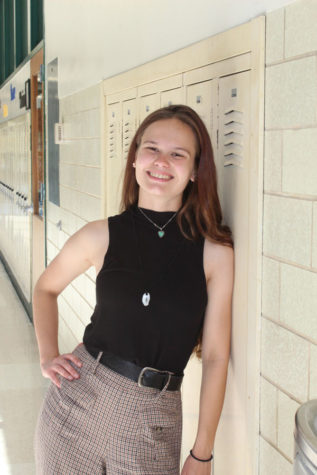Two Perspectives on ‘Dear White People’ (Review)
May 18, 2017
The controversial Netflix Original Dear White People is director Justian Simien’s tv adaptation of the 2014 film of the same name. Dear White People tells the uncomfortable truths about being a black person in America and its topics have gained a negative response from white people. A&E Editor Chaela Williams and News writer Samantha Martin reviewed the critically acclaimed series individually. Both reviews praised the show and encouraged not only white people, but for everyone to watch and listen to the struggles that black Americans face in this country.
Dear White People: Shut up and watch the show (editorial)
The Netflix original, Dear White People gives us chilling, realistic truths about living in a “post-racial” society as a black person.
Dear White People centers around fictional protagonist, Samantha White, a biracial black activist college student, who attends the prestigious, predominately white Winchester University. Her radio show, Dear White People, bravely points out racial occurrences that happen on campus, which faces defensive opinions from white people.
To go against the radio show, a white male sorority throws a blackface party that leads to a major conflict between the white and black students at Winchester.
The series focuses on the main black students who attend Winchester: White, Troy Fairbanks- son of the school’s dean, Colandera “Coco” Connors- tries to achieve greatness while avoiding her blackness, Lionel Higgins- a shy, awkward gay male who’s a reporter for the campus newspaper, Reggie Green- the aggressively pro-black activist who has deep feelings for Samantha, and including Gabe Mitchell, who is Samantha’s secret white lover.
Of course due to its controversial title, the series gained a negative reaction from white people.
Many had the audacity to call the brilliant show “racist” and suggested there should be a show called “Dear Black People.”
“Netflix are filthy Racists. Subscription cancelled,” YouTube user Rich Peacock commented.
“A show talking s**t about white people. How original Hollywood…” YouTube user Erik Mac commented.
“Dear White People is the most racist ignorant tv show I’ve probably ever seen. If America is that racist the one complaining should leave lol.” @AustinnTx12 tweeted.
White people’s reaction is exactly why this tv show was created in the first place. Many white people are afraid to listen to the truth about racism in the country especially if it’s coming from a person of color. They avoid the serious conversation and claim that minorities are “complaining,” that none of these issues actually exist but in reality it does.
Dear White People is a brutal awakening to those who think that Obama could’ve possibly ended racism or that racism ceases to exist.
The series focuses on racial tensions at a overwhelmingly white Ivy League School. It depicts the lives black students during the time of Black Lives Matter, police brutality, and the aftermath of the election of Donald Trump.
So no white people, Dear White People isn’t about going against Caucasians; it’s a outcry to take race and discrimination seriously and to listen to our experiences on being Black in America in the 21st century.
Disclaimer: Articles designated as “Editorial” represent the views and opinions of the author, not the 2016-2017 Periscope staff, CHS Administration, or the CHS student body.

Chaela is a member of the Periscope staff. It's also her third year on staff. She is a senior at CHS. She loves writing stories, watching anime,...
“Dear White People” contains important messages for all (Editorial)
Dear fellow white people, Netflix’s Dear White People is a must-watch series that both entertains and educates, despite its seemingly confrontational title.
Dear White People follows the lives of several black students at the canonically Ivy League Winchester University as they deal with the racism rampant across their campus. Their issues only increase after the university’s satirical magazine hosts a blackface party.
The show has been the subject of controversy since before it was released. Whenever the first trailer for Dear White People was released in late April, the Internet was filled with both excitement and anger. Many believed that the show’s title was antagonistic towards white people.
“Can you imagine the outrage if there was a show called ‘Dear Black People?,’” Twitter user @brandongroeny tweeted on April 30th, days after the release of the trailer. “Cities would burn. The anti-white rhetoric needs to stop.”
Other users claimed that they had cancelled their Netflix subscriptions promptly after the show’s announcement.
“I dropped @netflix like a hot potato when it was first announced,” said Twitter user @iammindy1 in a reply to @brandongroeny’s Tweet.
If a watcher chooses to see past the controversial title for the show, however, they will find a nuanced story about society’s many flaws, as well as issues found within the very movements that seek to correct these flaws.
Each episode of the series focuses on the life of one black student just before, during, and after the blackface party. Sam, the outspoken leader of the school’s civil rights movement , attempts to cover up two secrets: her white boyfriend, out of fear that she might be seen as betraying her black friends for dating someone of a different race; and exactly why she was at the blackface party, filming rather than ranting and participating it its shutdown.
Lionel, the cub reporter that learned about the blackface party and led a group of black activists to it to shut it down, also learns that he is gay after discovering he has a crush on his roommate, class president and dean’s son Troy. Troy himself has his fair share of secrets and struggles as well: he called the police to the blackface party to assist in the shutdown, and the fact that he has different aspirations than what his father, the dean, wants for him.
Coco, a black woman with mostly white friends, and who attended the blackface party with those friends, reflects on her past and why she lives the life she currently does.
The show is also incredibly well acted and well written. DeRon Horton is extremely convincing as the quiet rebel Lionel, and Logan Browning’s Sam is still likeable even after she makes a major mistake halfway through the series. Many shows with an ensemble cast have one unlikeable character and one seemingly perfect character, but all of the major characters in Dear White People have realistic character flaws but are still easy to care about.
The events that happen in the show are also incredibly realistic and seem like stories right out of the morning news: a student magazine hosts a blackface party at an Ivy League school, a college student is held at gunpoint after trying to defend himself in a fight. Nothing in the series is glamorized or sensationalized; instead, cold hard truth radiates through the series despite its fictional characters and setting.
This series not only shows the flaws within American society, especially its historically awful treatment of black people, but also issues that activists themselves face whenever they take on a holier-than-thou attitude. This idea that all activists must be the same way results in everyone losing a part of themselves: whether it be hiding who they love like Lionel and Sam, or hiding who they are like Coco and Troy.
Disclaimer: Articles designated as “Editorial” represent the views and opinions of the author, not the 2016-2017 Periscope staff, CHS Administration, or the CHS student body.

Samantha Martin is super excited to share the role of Editor-in-Chief with Abigail Lindsay during her fourth year on staff! She is also a member of several...
